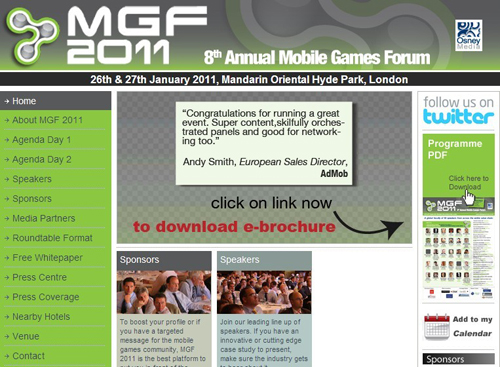MGF讨论话题:手机游戏发行商的意义何在?
开发商齐聚一堂时最频繁谈到话题就是:发行商对开发商的作用究竟有多大?
在日前举行的伦敦2011年手机游戏论坛上(MGF)上,GAMESbrief的开发商顾问尼古拉斯·拉弗尔(Nicholas Lovell)在小组讨论中率先表示,“如果这世上只有运营商,那你就需要一个发行商,但现在你不一定需要发行商了,除非他们能带来一桩很好的生意。”
Glu Mobile公司的奥利维尔·伯纳德(Olivier Bernard)则表示,确实有些开发商可以自己推出像《涂鸦跳跃》(Doodle Jump)这样成功的游戏,而另一些人则需要发行商提供市场营销和发行渠道支持,并表示Glu Mobile不但为开发商提供发行服务,而且在游戏开发过程中也会有所帮助;开发商通过Glu的发行渠道,可以更顺利地进入包括iOS在内的多个平台。
来自Connect2Media公司的格雷格·罗宾森(Greg Robinson)也很认同发行商的地位,“与发行商合作的好处在于,开发商可以专注于自己擅长的事情,那就是开发游戏,毕竟发行商每天都接触游戏发行业务,他们对这一领域更有经验。”
至于发行商究竟在哪方面比开发商单兵作战更胜一筹,罗宾森对此表示,开发商可以通过推出两三个作品了解如何发行游戏,但多数成功案例表明,许多开发商在游戏发行业务上仍然不得要领。
拉弗尔则认为,开发商与用户之间的关系,远比与发行商的关系更重要,发行商只是负责处理游戏知识产权,以及游戏与用户的关系;开发商可以靠这些东西自负盈亏,有更多机会向世界推出好作品,挖掘免费模式等新型运营模式的市场潜力。
拉费尔的观点是,“如果你的运营模式就是高价出售游戏,可能处境就会有点艰难,但如果是采用内置付费功能的免费模式,那么就有可能与用户建立长期而良好的互动关系,虽然大多数用户会一直免费玩游戏,但有些玩家却很舍得花钱,所以你并不需创造成百上千万的下载量,也有可能成功创收。”
这次会议的主席蒂姆·哈里森(Tim Harrison)自己就曾经是个发行商,他认为发行商提供的预算可以减轻开发商的资金压力,让后者全力以赴开发高质量的游戏内容。
Glu的奥利维尔·伯纳德赞同这一说法,“Glu一直在寻找拥有出色作品的开发商,我们会为他们提供部分资金支持,还有多个品牌和网站推广渠道,除此之外还掌握了每个用户的相关数据,并对这些数据进行了分析和研究。”
当哈里森将话题转向Android平台的时候,德国电信运营商Deutsche Telekon英国公司代表彼得·巴切尔(Peter Bacher)承认,运营商要与小型开发商合作推出Android版本游戏确实很困难。
奥利维尔·伯纳德却认为,Android手机游戏采用运营商计费系统更容易创造营收,Glu很乐于帮助运营商引进更多Android版本的游戏,运营商是这一市场的守门人,但这一点对Android平台的发展很有好处,Android开发商通过运营商渠道,往往比通过Android Market更容易赚到钱。
不过尼古拉斯·拉弗尔还是坚持认为,他们不喜欢被迫听从发行商的要求,开发商可以通过新的运营模式自己赚钱,在这个年代,游戏销售和市场营销过程本身就是游戏的一种创意,也就是说开发商不一定需要与发行商打交道。
Connect2Media的格雷格·罗宾森表示目前业内已经掀起了一股自主发行的热潮,发行商并不是想打压开发商,迫使他们服从自己的意志,而是因为大家要面临共同的风险,经历共同的发展过程,所以才不得不有所建议。开发商并不一定要出让自己的知识产权,Connect2Media也曾经为大型传统游戏公司多次发行作品,这个领域还有多种发行模式。
Glu的伯纳德也称他们不要求获得游戏知识产权,Glu会提供市场分析等增值服务,让游戏在市场竞争中胜出,与发行商合作总强过开发商独自作战。
当谈到亚马逊推出的Android应用商店时,格雷格·罗宾森的观点是,这是继运营商、手机设备制造商之后出现的第三种应用商店发展趋势,亚马逊拥有大量的用户,信用卡支付渠道也很强大,Connect2Media很乐见这种情况。
哈里森又抛出了一个问题:运营商渠道卷土重来,所以发行商的优势应该更加明显了。
奥利维尔·伯纳德:当然,有了发行商的支持,开发商所承受的风险更小,而且更容易赚到钱。
尼古拉斯·拉弗尔:共享是一种新的市场营销方式,独立开发商真正的机遇就是共享,虽然那种自上而下的行事方式(游戏邦注:这里指运营商模式)仍然会存在,但结果不会太让人满意。如果你不了解游戏开发或游戏发行,那就有可能在五年之内丢掉工作。
格雷格·罗宾森:尽管社交群体的力量很强大,但人们还是得亲自寻找和购买自己所喜欢的内容,用户的冲动性消费仍将长期存在,而这也正是运营商和发行商的作用所在。
最后一个话题是:如何区分出色的发行商或不理想的发行商?
格雷格·罗宾森:只要问问他们能给你的游戏带来什么帮助,会向用户传达什么信息,曾经和哪些开发商合作过就行了。但你得明确表达自己的项目发展目标,让发行商清楚地了解你的规划,这是一种双向沟通的关系。(本文为游戏邦/gamerboom.com编译,转载请注明来源:游戏邦)
MGF 2011: Panel: So what’s the point of a mobile publisher anyway?
It’s the question that always arises when developers cluster together; what’s the role of the publisher?
“You don’t need a publisher now,” kicks off Nicholas Lovell, developer consultant at GAMESbrief.
“In the world of carriers, you needed a publisher. Now you don’t need a publisher, but some developers will use a publisher if they get a good deal from them.”
“There is room for everyone,” half agrees Glu Mobile’s Olivier Bernard. “There will be some developers who will release a Doodle Jump success, while some will need publishers to help them out in terms of marketing and channel support.”
“We work with developers on co-development deals as well as publishing almost completed games. You don’t come to Glu just for iOS. We cover every platform, across the world,” he adds Greg Robinson of Connect2Media is – unsurprisingly – also bullish on the publisher role. “The advantage of using a publisher is you can focus on what you do best, which is making a game. The publisher is publishing games every day of the week.”
Who has the love?
But what can publishers do better than developers who love their games, asks chairman Tim Harrison?
“Developers can burn two or three products learning how to publish a game if they want,” argues Greg Robinson. “But for every success story, there are hundreds of developers who aren’t.”
“The relationship with the consumer is more important than the relationship with the publisher, who will take your IP and your relationship with the consumer,” says Lovell.
“You give these things up in order to pay your wages. Being a developer gives you a better chance of have a global hit and exploring new business models such as freemium.”
Will this attitude shift to console games, Harrison ponders?
Nicolas Lovell has a view (oh really!): “If your business model is about selling something at a high price, I think you will struggle. But if it’s a freemium model with in-app purchases, you continue to build a relationship with your consumers, most of whom will play for free forever.
“But a few players will spend a lot of money on your game. You don’t need millions of downloads to be successful.”
Money for new rope
Harrison – an ex-publisher himself – thinks the budget publishers can enable means developers can build higher quality content.
“We are looking for developers who have a fantastic product and we will partially fund that,” agrees Glu’s Olivier Bernard. “We also have many brands and networks available in terms of promotion. We measure the data for every user. We study it very carefully.”
Harrison shifts the focus to Android.
“It’s hard for us a carrier to partner with small developers for Android,” Peter Bacher from Deutsche Telekon UK confesses.
“We see a lot of money being available on the carrier deck for Android,” Olivier Bernard enthuses.
“We will be keen to help operators make more Android games available. There is a gatekeeper, the carrier, but that is good for Android. I think you’ll get more money from the carrier on Android that via the Android Market.”
Core values
“But I hate asking for permission to do things. It’s easier to ask for forgiveness,” Nicholas Lovell says.
“This new model enables developers to make money from things they care about. In this new world, the sales process and marketing is part of the creative story of the game, and that means I don’t need to talk to a publisher.”
“There’s a bonfire of self publishing,” replies Connect2Media’s Greg Robinson.
“Publishers aren’t going to beat down on developers to get them to do things. It’s a shared risk and shared development model. You don’t have to give up your IP. We are republishing for large console companies. There are many models in the world.”
“We’re not asking for IP rights either,” says Glu’s Bernard. “We’re adding value in terms of analytics and the chance to stand out from the competition. Publishers give you a better chance of doing that than attempting to do it on your own.”
What about the impact of the Amazon store, asks Harrison?
“It’s the third wave after carrier and OEM stores. Amazon’s power in the number of consumers and credit cards it has access to. We’re there for the US launch. We’re really excited about it,” says Greg Robinson.
Question: The carriers are coming back. You should be more bullish
Olivier Bernard: “Sure, with a publisher, you have less risk and you make some cash.”
Nicolas Lovell: “Sharing not telling is the new method of marketing. The real opportunity for the indies is sharing. It’s about motivating the tribes. The topdown model of making things easy for consumer [carrier model] will exist, but it’s not so exciting. If you’re not in content creation or content distribution, you’ll be out of a job in five years.
Greg Robinson: “Social communities are great but people still have to find and buy the content they like. There will always be the impulse purchase. That’s where the carrier and publisher are.”
Q: How can you tell between good and bad publishers?
Greg Robinson: “Ask them what they will do for your game, and talk to the community and other companies who have worked with them before.”
Nicolas Lovell: “Do you like them and trust them?”
Greg Robinson: “You have to clear about you want to do with your game. It’s your vision. Be sure the publisher knows what you want to do with the game. It’s a two-way relationship.”(source:pocketgamer)








































 闽公网安备35020302001549号
闽公网安备35020302001549号